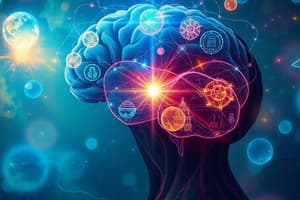Podcast
Questions and Answers
Who coined the theory of multiple intelligences?
Who coined the theory of multiple intelligences?
- Gardener
- Albert Einstein
- Howard Gardner (correct)
- Robert Sternberg
What is the number of aspects of intelligence according to the theory?
What is the number of aspects of intelligence according to the theory?
- 3
- 8 (correct)
- 5
- 10
What is the main idea behind the theory of multiple intelligences?
What is the main idea behind the theory of multiple intelligences?
- Intelligence is a single entity
- Intelligence is composed of multiple separate entities (correct)
- Intelligence is only verbal
- Intelligence is only analytical
What is the ability to acquire knowledge and think abstractly?
What is the ability to acquire knowledge and think abstractly?
What is the ability to use information to solve problems?
What is the ability to use information to solve problems?
What is the ability to think and reason abstractly?
What is the ability to think and reason abstractly?
What is the ability to process and analyze information?
What is the ability to process and analyze information?
What is the ability to use knowledge to solve problems?
What is the ability to use knowledge to solve problems?
What is the primary function of verbal-linguistic understanding in learning?
What is the primary function of verbal-linguistic understanding in learning?
What is the outcome of developing logical-mathematical ability?
What is the outcome of developing logical-mathematical ability?
What is the role of spatial ability in learning?
What is the role of spatial ability in learning?
What is the result of automaticity in learning?
What is the result of automaticity in learning?
How does verbal-linguistic understanding contribute to problem-solving?
How does verbal-linguistic understanding contribute to problem-solving?
What is the relationship between logical-mathematical ability and problem-solving?
What is the relationship between logical-mathematical ability and problem-solving?
What is the outcome of developing verbal-linguistic understanding?
What is the outcome of developing verbal-linguistic understanding?
What is the role of experience in learning?
What is the role of experience in learning?
What is the naturalist's ability to understand?
What is the naturalist's ability to understand?
What is general intelligence or 'g' responsible for?
What is general intelligence or 'g' responsible for?
What is the interpersonal ability of a therapist?
What is the interpersonal ability of a therapist?
What is the intrapersonal ability of an individual?
What is the intrapersonal ability of an individual?
What determines cognitive performance?
What determines cognitive performance?
What is a flaw in general intelligence or 'g'?
What is a flaw in general intelligence or 'g'?
What are short-term memories related to?
What are short-term memories related to?
What is the botanist's ability to understand?
What is the botanist's ability to understand?
What is the type of response that occurs after being exposed to a neutral stimulus, such as salivating after hearing a tuning fork?
What is the type of response that occurs after being exposed to a neutral stimulus, such as salivating after hearing a tuning fork?
What is the primary goal of positive reinforcement in learning behavior?
What is the primary goal of positive reinforcement in learning behavior?
Which theory suggests that behavior can be learned through the consequences of actions?
Which theory suggests that behavior can be learned through the consequences of actions?
What happens to a behavior when it is negatively reinforced?
What happens to a behavior when it is negatively reinforced?
What is the outcome of presenting a stimulus immediately after a desired behavior, such as giving a sticker for cleaning a desk?
What is the outcome of presenting a stimulus immediately after a desired behavior, such as giving a sticker for cleaning a desk?
What type of reinforcement involves the removal of an unpleasant stimulus to increase the frequency of a behavior?
What type of reinforcement involves the removal of an unpleasant stimulus to increase the frequency of a behavior?
What is the primary difference between positive and negative reinforcement?
What is the primary difference between positive and negative reinforcement?
What is the ultimate goal of reinforcement in learning behavior?
What is the ultimate goal of reinforcement in learning behavior?
What is the key factor in effective punishment, according to the text?
What is the key factor in effective punishment, according to the text?
Who is credited with coining the theory of observational learning?
Who is credited with coining the theory of observational learning?
What is the term used to describe the process of observing behavior and its consequences?
What is the term used to describe the process of observing behavior and its consequences?
What is the first principle of observational learning, according to Bandura?
What is the first principle of observational learning, according to Bandura?
What is the primary way in which we develop emotional, cognitive, and social abilities, according to Bandura?
What is the primary way in which we develop emotional, cognitive, and social abilities, according to Bandura?
What is the term used to describe the process of remembering behavior through memory tactics?
What is the term used to describe the process of remembering behavior through memory tactics?
What is the purpose of punishment, according to the text?
What is the purpose of punishment, according to the text?
What is the term used to describe the process of repeating behavior, according to Bandura?
What is the term used to describe the process of repeating behavior, according to Bandura?
Study Notes
Intelligence Theories
- Robert Sternberg coined the theory of Multiple Intelligences, which proposes that there are eight separate types of intelligence.
- The eight types of intelligence are:
- Verbal-Linguistic: ability to verbalize and process verbal information
- Logical-Mathematical: ability to reason abstractly and think logically
- Spatial: ability to recognize and manipulate objects in space
- Naturalist: ability to recognize and understand living things
- Interpersonal: ability to understand other people's intentions and behaviors
- Intrapersonal: ability to understand one's own thoughts and feelings
- Analytical: ability to evaluate and analyze information
Intelligence and Cognitive Abilities
- General Intelligence (g) refers to the general ability to perform cognitive tasks
- Specific abilities are applied to specific tasks and skills
- Cognitive performance is determined by the interaction of specific abilities and general intelligence
Learning Theories
- Positive Reinforcement: behavior is strengthened by a desirable consequence
- Negative Reinforcement: behavior is strengthened by the removal of an undesirable consequence
- Punishment: behavior is weakened by an undesirable consequence
- Observational Learning: learning through observing others and imitating their behavior
Bandura's Theory
- Albert Bandura disagreed with Pavlov's behaviorism and proposed that behavior is learned through observation and imitation
- Triadic Reciprocal Causation Model: behavior is influenced by personal factors, environmental factors, and behavior itself
- Self-Efficacy: believing in one's ability to perform a task
- Observational Learning has four principles:
- Attention: paying attention to the behavior and its consequences
- Retention: remembering the behavior through memory tactics
- Reproduction: repeating the behavior
- Motivation: having a reason to perform the behavior
Studying That Suits You
Use AI to generate personalized quizzes and flashcards to suit your learning preferences.
Description
This quiz covers the theory of intelligence coined by Robert Sternberg and explores the three types of filial intelligence. Test your knowledge on this important concept in psychology!




